Leon de Winter & Co
The Dutch author and director Leon de Winter is one of the best known authors in the German language area. De Winter lives in Amsterdam, but also regularly stays in the United States. In 2005 he gave a lecture at University of California, Berkeley (Anne Frank and after, on Dutch literature in translation). Leon de Winter's home base in the German language area is Zürich.
“Placid reflection like Cees Nooteboom's, philosophical grounding like Harry Mulisch's, quirky Eastern European Jewish psychology like Arnon Grunberg's, that is not De Winter's thing. He prefers to let it rip, to let his heroes discover their abilities as fighters, even murderers if necessary, to let super-sexy seductresses turn corners, and, as a narrative ace, pulls the most impossible twists out of his sleeve at any time.” (Schümer, 2014)
About the emptiness in the world
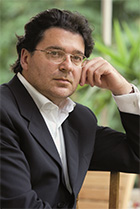
Leon de Winter's debut publication (1976) had a telling title: Over de leegte van de wereld [About the emptiness of the world]. In his work, Leon de Winter tries to fill this emptiness with stories. In his stories, he interprets reality and tries to discover the motives that drive his characters.
It was precisely for this tracing that he was awarded the Welt-Literature Prize by the German newspaper Die Welt in 2002. The jury honored him "for his novels, which are both complex in structure and exciting to read, in which the author is highly comical while also extremely insightful recounting about the drivenness of modern man" (Siem Bakker).
Several of De Winter's books have been made into films, including De (ver)wording van de jongere Dürer [The Demise of the young Durer] in 1979, Hoffmans' hunger in 1993, De hemel van Hollywood [The Sky of Hollywood] in 2001 and Supertex in 2003. Between 1999 and 2017, WDR and NDR adapted three of his works as radio plays. Leon de Winter does not mince his words. The essays that he publishes with great regularity in German media like Die Welt, Der Spiegel, Die Zeit and the Süddeutsche Zeitung, on topics such as islamism as the fascism of the twentyfirst century, are provocative and always offer material for discussion. De Winter is a welcome guest on German radio and television programs. His adaptation of The Diary of Anne Frank (in cooperation with his wife Jessica Durlacher) was performed in Germany in 2014 (Ernst Deutsch Theater in Hamburg).
Let's get out of here! The Adventures of a new ne'er-do-well
Ten years after his debut in the Netherlands, Leon de Winters' first German translation was published by Aufbau Verlag in Berlin under the somewhat ponderous title Die (ver)Bildung des jüngeren Dürers. In this book, which describes the meanderings of a young, unemployed ex-convict, the main character tries to free himself from the lies that define his life following the motto of "Let's get out of here!". A convincing "A psychogram of a sensitive young person" (Sturm, 1987) facing "an existance devoid of meaning" (Sturm, 1987). When the book appeared, the Berlin Wall had not yet fallen and the reviews turned out accordingly:
"This book is about young people not being understood in a capitalist society, about consumerism, lack of love, loneliness, sensory overload through advertising and media, unemployment, helplessness, crime". (Hube, 1987)
The same review also mentions "strained, somewhat mannered prose", apparently not really compelling thus. But Aufbau Verlag remained faithful to its author. In 1990, Die (ver)Bildung des jüngeren Dürers was still broadcast as a radio play by Radio DDR, but in search of new readers Aufbau chose a new title for the story (Nur weg hier! Die Abenteuer eines neuen Taugenichts [Let's get out of here! The Adventures of a new ne'er-do-well]) a few years later, and presented three new editions of the translation in the course of the 1990s, each time with a new cover.

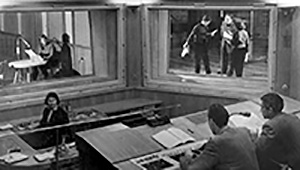
The making of 'Die (ver)Bildung des jüngeren Dürers' by Radio DDR (1990)
Diogenes
Meanwhile, De Winter found himself a new home base. After an intermezzo with Piper, Hoffman's Hunger was published by Diogenes in Zurich, a year after the 1993 Frankfurt Book Fair with Flanders and the Netherlands as guest of honor. (#Publishers) With his "gripping" and "sensual" written "Zeitroman" (Brockschmidt, 1994) about the "sleepless embassador" (Wallmann, 1994) Hoffman, De Winter finally reached a wide audience. Between 1995 and 2005, a new title by De Winter appeared in Zurich almost every year: Supertex (1995), Serenade (1996), Zionoco (1997), Der Himmel von Hollywood [The Sky of Hollywood] (1998), Sokolows Universum (1999), Leo Kaplan (2001), Malibu (2003), Place de la Bastille (2005).
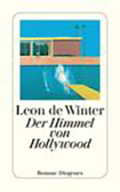
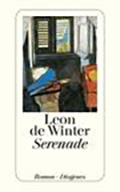
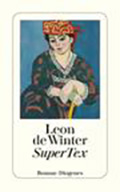
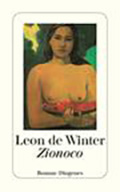
"Since the apperence of the novels „Supertex" (German 1993) and the brilliant „Hoffmans Hunger" (German 1994) at the latest, Leon de Winter is also known in these parts as one of the most important Dutch authors." (August, 2005)
At the beginning of the twentieth century, Leon de Winter was one of the big new stars of Dutch literature in the German-speaking world.
Jessica Durlacher and Solomonica de Winter

When the debut novel of Leon de Winter's wife, Jessica Durlacher, was translated into German by his translator Hanni Ehlers (#Translators), it was only natural that it was published by Diogenes. Das Gewissen [The Conscience] - the best-selling literary debut of 1997 - appeared in German 1999 and was well received. It has been repeatedly pointed out that Das Gewissen is, in a certain way, a literary mirror of Jessica Durlacher's relationship with her husband, but much more attention is given to the topic that really defines Durlacher's work: her approach to the events of the Second World War as a representative of the second-generation Holocaust survivors. Jessica Durlacher's father was Gerhard Durlacher (link). Like Leon de Winter's father, he was one of the few members of the family that survived the Holocaust.
“It is certainly unfair to introduce an author via her father, but this substrate of life experience is so specific and shapes Jessica Durlacher's narrative so consistently that one may bring this origin to mind” (Bormann, 1999)
In her third novel, Emoticon, Jessica Durlacher lets go of the trauma of second-generation survivors and focuses on the life of a young Palestinian and her relationship with a young Israeli. The story, which is based on real events, has a tragic ending, but Emoticon is more than a novel about a tragic love, which is probably the reason why three editions of this book in particular were published. It is not only a "fist-class political thriller" (Krekeler, 2006) but also offers a very varied, kaleidoscopic perspective on the reality of the twentyfirst century.
"Cool, confident and style-consciously told" Frankfurter Allgemeine Zeitung (where?)
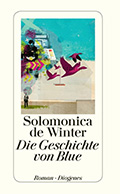
In 2016, fitting to the second time Flanders and the Netherlands were guest of honor at the Frankfurt Book Fair, the debut novel of Solomonica de Winter, the daughter of Leon de Winter and Jessica Durlacher, was published by Diogenes. Die Geschichte von Blue, was originally written in English (Over the Rainbow) and translated from English into German and Dutch (Achter de regenboog). With the inclusion of Solominica de Winter's book among the titles of Diogenes, all writing members of the De Winter family are represented there. But not only that, it is uncommon that a German translation of a book by a Dutch writer appears before the book is marketed in Dutch and also that the Frankfurter Allgemeine is quoted on the cover of a book in Holland. Meanwhile, Solomonica de Winter's second book - Das Gesetz der Natur [The Law of Nature], is in preparation. It will also appear with Diogenes in 2022, the same year in which Jessica Durlacher's new "pageturner" (Stoltenberg, 2022) Die Stimme [The Voice] was published.
(Herbert Van Uffelen)
References
August, Hans-Jürgen: Den Lauf der Geschichte ändern - Leon de Winters literarisches Frühwerk 'Place de la Bastille'. In: Wiener Zeitung, Vol.: 239 [09.12.2005], (2005) - p. 11.
Bakker, Siem: Mensen bestaan bij de gratie van verhalen - Het oeuvre van Leon de Winter. In: Ons Erfdeel, Vol.: no. 46, (2003). (https://www.dbnl.org/tekst/_ons003200301_01/_ons003200301_01_0167.php)
Bormann, Alexander von: Mühsame Selbstbefreiung - Jessica Durlachers Débutroman 'Das Gewissen'. In: Neue Zürcher Zeitung, Issue: 14. sept. - Zürich, (1999).
Brockschmidt, Rolf: Das Schicksalsjahr 1989 - Leon de Winters fesselnder Zeitroman. In: Der Tagesspiegel, Vol.: Nr. 14 871, Issue: 2.-4. april, (1994).
Hube, Hans-Jürgen: Unverstanden – Rezensionen. In: Das Sonntagsblatt, (1987).
Krekeler, Elmar: ]:->steht für Teufel In: Die Welt (Die literarische Welt), Vol.: 15-04-2006, Nr. 15, Rubrik: Buch der Woche, (2006) - p. 3.
Schümer, Dirk: Leon de Winter zum sechzigsten. Dieser Mann lässt es krachen. In: Frankfurter Allgemeine, Issue: 26. feb., (2014). (https://www.faz.net/aktuell/feuilleton/leon-de-winter-zum-sechzigsten-dieser-mann-laesst-es-krachen-12816851.html)
Stoltenberg, Annemarie: Die Stimme - Ein echter "Pageturner" von Jessica Durlacher. In: NDR Kultur, Issue: 24. may, (2022).
Sturm, Kirsten: Suche nach dem Lebenssinn. In: Liberal-Demokratische Zeitung, Vol.: no. 120, Issue: 23. may - Halle, (1987).
Wallmann, Hermann: Der schlaflose Botschafter - Leon de Winters Roman aus den letzten Tagen des alten Systems: 'Hoffmans Hunger'. In: Süddeutsche Zeitung, Issue: 12.-13. march, (1994).
